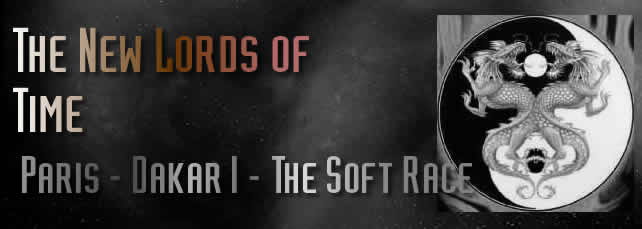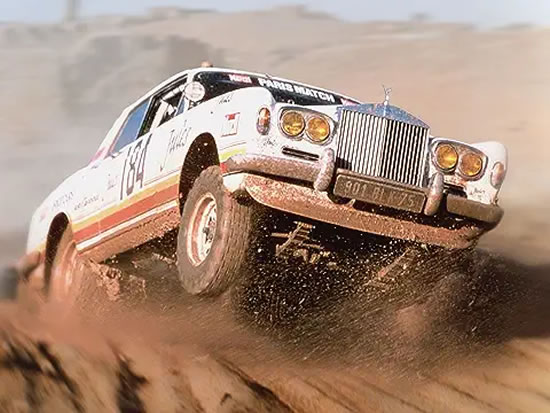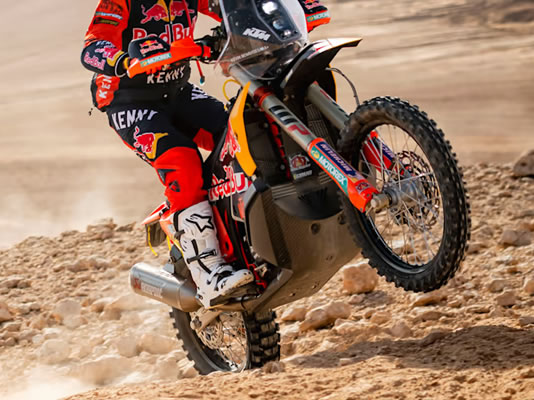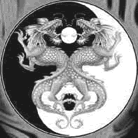

Earl turned in the passenger seat of the Land Rover Defender. He looked past the array of classic vehicles from the same era of internal combustion transport to the Eiffel Tower which was visible from almost everywhere in Central Paris
“I’m surprised the Daleks didn’t destroy it,” he remarked.
“Dad said they used it as a communication relay,” Sukie answered. She was looking straight ahead along the curiously packed lanes of the Champs Elysées. “They used the Empire State Building and the Christo Redentor in Rio and all sorts of places like that. They didn’t care about human monuments. They just liked that they were high places. They used the Robomen slaves to put the equipment in. And ... I wish sometimes I didn’t know all that. I sort of have to because my mum and dad fought the Daleks, and grandad Robert up in Scotland, and my great grandfather is the man who foiled them in the end and won the war. It’s my ‘legacy’. But I wish it wasn’t. That’s one reason I’m here. We’re making our own legacy in the next week.”
“You’re only doing it now because your mum is distracted by the new babies,” Earl pointed out with a smile that she adored as much as his words annoyed her.
They annoyed her because it was true, of course. The twins, Robert and Sheelagh, named after granddad Robert who lived with them, still, and his wife who had died during the Dalek war, were taking up all of Susan’s time now. She had hardly raised an eyebrow when she told both of her parents that she was planning to enter the Paris to Dakar Thierry Sabine Memorial Rally.
Her father had paid a bit more attention, but he had grilled Davie about it. He always did when she entered a new level of racing, from carts to junior cars to the full adult race licence she had acquired as soon as she was eighteen. Now he questioned her older brother about the dangers of a ten thousand kilometre desert race which had claimed lives over the centuries.
The race hadn’t been run since before the Dalek War, so she had banked on her father not knowing about those details.
He hadn’t known, as such, but he had asked the questions and Davie had never lied to his father. He emphasised that a lot of the fatal incidents had stemmed from recklessness and that motor bike riders were more often hurt than car drivers, and that he would be in charge of her support crew, so all possible care would be taken.
David Campbell had also queried the fact that boyfriend Earl was going to be Sukie’s co-driver.
“Another reason I’m in the support vehicle,” Davie had responded. “I told him the rules when she was thirteen. They still stand. He may be a grown-up Time Lord now, with his own time transport, but he’s still scared of me.”
David Campbell noted that his son’s grin at that point matched his own. They understood each other fully on that score.
“I AM nineteen,” she said as she waited for the starting signal. “I don’t need their permission. I was telling them, not asking.”
“Of course,” Earl agreed, but only because it paid not to disagree with Sukie when she was in power woman mode.
“Davie is well on his way to Malaga,” Sukie added, apparently apropos of nothing. “He isn’t watching either of us.”
This was true. Earl admitted as much.
“We have twenty hours in which to reach the ferryport, without breaking the 160kph limit imposed on all drivers. We don’t have time to do anything he might disapprove of.”
Sukie conceded the point, then gave her fullest attention to the line-up of one hundred and eighty-two vehicles, comprising motorbikes, cars and trucks. Engines were revving. The front group of bikes had been given the green flag. There were two more categories of bike and one of cars before their group, four wheel drive vehicles .
She was used to racing or rolling starts in her usual race categories. This was different.
She was half expecting to stall the car, even though she hadn’t done that since her first practice in a Junior Ginetta at age fourteen. That was the only reason she was looking a little tense as the Champs Elysées cleared ahead of her and she waited her turn to be off.
Then it came and the Defender went from a standing start to fifty kilometres per hour in mere seconds. It couldn't’t do much more because the road ahead was still full of competitors and she wasn’t going to have an accident before the first corner.
It was one hundred and eighty-two vehicles because that was exactly how many began the first Paris-Dakar rally in 1979, and this was the first time it was being held again in living memory.
It was happening because of an anonymous donation and the careful plans of a committee of people who liked automobile racing. Sukie was one of the few people who knew that the anonymous donor was her own brother and support crew manager, Davie, who had just sold the patent rights of a solar-powered combine harvester to the Indian government for a huge sum of money he really didn’t need having lit up most of the world with his micro solar panels. Being anonymous allowed him to be on the panel that hammered out the rules.
Firstly, all vehicles were ‘classics' from the late twentieth and early twenty-first century. They had to be ground cars, because what was the point of an off-road desert race in a hover car. They had to be converted to modern biofuel, but no other modern adaptions were allowed. In particular, no satnav or GPS technology was permitted. Maps could be on digital screens, but they were only to show topography, not to pinpoint the vehicle within it. Old fashioned orienteering was still needed.
And a whole bunch of other rules Sukie was sure her brother had put in just to annoy her.
Not that they had. She enjoyed a challenge, and this was the ultimate. The longest automobile race in the world, over the toughest terrain.
Oh, yes, she was ready.
“I hope Stuart got a clear start,” Sukie commented as a series of turns brought them to Rue Jacques Chirac, along the banks of the Seinne where the competitors were already stretching out from their bunched up start. Stuart, Spenser’s husband, was up ahead somewhere on a BMW motorbike as the second Team Campbell competitor. Spenser was on the support crew with Davie, heading down a French motorway in a Land Rover 101 loaded with spares and emergency supplies and Davie’s TARDIS disguised as a cupboard in case of really desperate measures. What those were, short of a military coup in any of the countries they were passing through in the course of the next days was anyone’s guess. But it was there, anyway.
“Everyone started ok,” Stuart answered, after listening to the digital radio tuned to the race commentary that WAS permitted, along with two-way short wave radios strictly for emergency.
In a dire situation, of course, Sukie could contact her brother telepathically. But he had made it a special rule, just for her, that she was not to do so unless she and Earl were upside down in a sink hole with actual limbs missing. She couldn’t have an advantage over other competitors.
Again, that was ok. Though she hated being cut off from her brother that way. Telepathy was their birthright, after all.
Paris was easily left behind, and so were most of the competitors coming up behind them. Those ahead were also out of sight as they travelled at one hundred kilometres per hour on the dual carriageway, between agricultural land tilled for centuries by French farmers. Mountain ranges lay in the distance and picturesque chateaus were glimpsed every so often as well as road signs for small towns the road by-passed, but neither of them really paid any attention.
This was the easy bit, of course – a dash through France, Catalonia and Spain on a designated route cleared of ordinary traffic by rolling road closures. There should be nothing to worry about except getting bored with fields or running out of things to talk about.
Whatever any other drivers thought about fields or conversation, Sukie and Earl had no difficulties. They were young and in love and sharing an adventure.
They swapped places around the four hour mark, with Earl taking over the driving seat while Sukie rode shotgun and opened up a bag of easily handled foodstuffs. She handed Earl a nutrition bar and placed a bottle of orange juice where he could reach it while still driving one handed.
“Lyon is a hundred kilometres ahead, she commented as she ate her own share of the snacks. “But this is a by-pass route. We won’t go near it.” She sighed slightly. “I’ve never seen Lyon in daylight. Grandad has taken me and Vicki loads of times to see the Fete des Lumières, but we always arrived by TARDIS after it was already dark.”
“Maybe we could go there for our honeymoon,” Earl dared to suggest.
Sukie had every intention of marrying Earl in the foreseeable future, but she stubbornly refused to discuss any aspect of the wedding with anyone, especially not Earl, her mother or Vicki, who had been hinting for a long time about a double ceremony. Vicki was excited by white dresses and lace veils. Sukie, not so much. She was having trouble imagining that walk down the aisle looking like the sort of fairy tale princess she usually despised.
Fortunately, Earl dramatically changed the subject by demanding to know what flavour the nutritional bar was.
“Oh, I think you have my cheese and bacon. I’ve got chicken tikka, here,” Sukie replied, swapping the bars quickly.
“That’s better,” Earl said, biting into the replacement. “Concentrated meals are great for travelling, but cheese and bacon is just TOO bland.”
“It could be worse,” Sukie commented. “Davie once showed me something he found stored in his TARDIS. A machine that created food wafers that were supposed to taste of ANYTHING you asked for, but they just seemed to default to boiled egg.”
They laughed together at what must have been very old technology even for Time Lords.
“Is that another competitor ahead?” Sukie asked as they passed a sign marking the city of Lyon as only sixty kilometres away. There was something in the distance, but it didn’t look like a vehicle capable of crossing an arid desert in the second phase of the rally.
And it certainly wasn’t.
“Wasn’t that...” Earl began.
“A Citroën 2CV,” Sukie answered as they very quickly left the car receding in the rear view mirror. Twentieth or twenty-first century, the same as this Land Rover. But I DON’T think it IS another competitor.”
“The trailer of hay behind it is a BIT of a clue, I guess,” Earl agreed. “The road is supposed to be closed for the rally.”
“Local farmer got confused,” Sukie guessed. “It’s a very odd social anomaly, but there are two kinds of people who repurpose antique vehicles – rich enthusiasts like Davie bidding for rusty old sports cars and poor people doing their best with cars that were more or less junk even in their proper century. Modern hover cars like the one my dad drives are expensive, but something that’s been in a barn for two centuries is easy to resurrect.”
“There’s a post-graduate sociology paper in there,” Earl said. “I might work on it some time.”
“We could do it together in the racing off-season,” Sukie conceded. It sounded a bit like something they would do after they were married, but not part of the actual wedding, so that was okay.
Lyon was the last road sign that especially interested Sukie. A series of French towns and villages were by-passed with only the briefest glimpses of old church spires to identify them. Sukie tried not to let on how boring it was when she wasn’t even doing the driving. The bewildered farmer aside there was nobody else on the road, no other competitors to race against. She was starting to think a ten thousand kilometre rally wasn’t so much of a thrill as she had expected.
“Sukie is bored,” Davie said to his travelling companion, Spenser Draxic.
“You’re still monitoring her telepathically?” Spenser noted. “And she doesn’t know? I’m impressed. She’s sharp. I’m surprised she hasn’t felt you interfering.”
“I know I shouldn’t. But I haven’t REALLY told her or dad how dangerous this race is. I’m not taking any chances. Besides, I’m not listening in all the time, just a spot check from time to time.”
“If she DOES find out she’ll give you hell. And what about night time, when she’s bivouacking with Earl?”
“That’s different. Some things a big brother doesn’t want to know. Anyway, it’s enough to know that Earl is scared of me and of doing anything unbecoming of his Time Lord honour.”
Spenser laughed. “When we get to the desert I intend to be bivouacking with Stuart. Time Lord honour won’t be a factor.”
“He’ll have done twelve hours on an off-road motorcycle before he reaches you each night. He probably won’t be interested in anything except a well-padded sleeping bag.”
Spenser conceded as much, but still regarded camping under desert stars with his lover as something to look forward to.
“Anyway, if boredom is the worst problem Sukie has to contend with, she’ll be doing well,” Davie added before checking an upcoming motorway sign for distance to the Catalonian border stop that was their first muster point. He was glad to see it even if it was still hundreds of kilometres away.
Boredom was a factor for support drivers, too.
The border with Catalonia, the independent province between France and Spain, was a little less than halfway through this first day’s rally. The arrival times for every competitor was recorded at La Jonquera, a small town that had stood sentinel on one of the lowest passes through the Pyrenees since before the Roman Empire ruled all of this part of Europe. Passports were checked before a two hour stop for food, fuel and a certain amount of social contact between drivers and support crews before they returned to the rally.
They set off again according to their timings so far, the fastest first. Sukie was driving again and was pleased to note that they were in the top eight of their class. She was determined to move much further up by the time they reached Malaga.
“Border checks and passports are strange to me,” Earl admitted as they picked up speed on the wide dual carriageway. “In my century we don’t really have that sort of thing. People still have their languages and culture, traditions and all, but they don’t worry so much about being French or Spanish. Being human is enough.”
“Two problems there,” Sukie pointed out. “Firstly, neither of us are purely Human. And secondly, this is Catalonia, not Spain. The people here fought bitterly to be recognised as separate and I bet even in your century they don’t let anyone forget that.”
Earl conceded that there was always a local pride. He certainly thought of himself as English – English-Time Lord if pushed to detail.
“In Grandma Jackie’s century, they had something called the Eurovision Song Contest,” Sukie noted. “Every country sent a singer or group with a song, and the winners got to hold the next year’s contest in their country. She said it was cutthroat, with countries voting against each other because of politics. As for football – that was a whole new lot of rivalry.”
“I know about the football,” Earl admitted. “I covered it in social studies at school. Never heard of Eurovision, though. I wonder if your brother knows about it. It sounds like something he could secretly revive like he did with this Rally.”
“I don’t think they ever had his kind of music on it,” Sukie considered. “Or he very well might have done.”
They laughed knowingly. Not many people were fully aware of how many of the motorsports that had been revived in recent years had Davie Campbell as their secret benefactor. His micro-solar panels and various other patents made him more money than anyone needed. He was always looking for ways to spend some of it.
“I’ll mention this Eurovision to him, some time,” Earl suggested.
“I bet Spain still won’t give Catalonia any points,” Sukie pointed out.
Ahead, there were signs for Barcelona, the Catalonian capital city, and another place she had always visited by TARDIS, before. If they were lucky, they might just glimpse the spires of the Sagrada Familia as they raced past the city.
The ‘soft’ race was not really her idea of fun. They rarely saw any other competitors except twice when a Jeep Renegade had a flat tyre by the roadside and a Mitsubishi was suffering an overheated engine.
And the really old car doing about forty kilometres per hour that they had a fleeting glance of just after they by-passed Barcelona.
“Was that….” Earl began.
“A nineteen-seventies SEAT,” Sukie confirmed. “Probably a 1400. Even older than the 2CV we passed in France and just as lost.”
“Another example of that social division between rich and poor car restorers,” Earl noted. “Were we meant to give help to our fellow rallyers by the wayside, do you think?”
“No,” Sukie answered. “If they were injured, that’d be different. But if they can’t get across the European section without mechanical trouble they shouldn’t be in the race to start with. Nothing we could or should do. Serves them right, anyway, for not looking after their cars. No way a Jeep should have broken down so easily if it was properly maintained.”
Earl bent to his future wife’s opinion on the matter. She knew more about cars than he ever wanted to know. Besides, he was only on this advanced road trip to spend some quality time alone with her, away from her brothers, her parents, cousin Vicki, The Doctor, and all the rest of her extended and vigilant family.
The view was pleasant as the warm afternoon slipped into evening and having past another frontier from Catalonia to Spain, the route hugged the Iberian coast. They enjoyed fragrant sea breezes that would be a fond memory after they hit the desert heat tomorrow afternoon. Sunset was at the same time beautiful and romantic and a driving hazard with the reflection off the sea dazzling to their eyes.
Then after balmy twilight they were night driving, at the tail end of a day that had started just after dawn as they prepared for the seven a.m. starting line. Even taking four hour shifts and napping when they could, Sukie and Earl, in common with their fellow competitors, had passed the point where commercial drivers were legally required to stop and rest. This was endurance driving, now. They drank coffee from rehydrated foil cups and talked to keep each other alert, their way illuminated by the high sodium lights of a dual carriageway, the sea a darkness on one side, a range of mountains they didn’t feel like learning the name of forming a more jagged darkness on the other. Stars were in the sky but not quite fully visible above the road lighting.
Davie and Spenser were already at Malaga port, in a waiting area made available to the Rally participants. The support vehicles were already aboard the specially chartered passenger ferry but most of the crew were ashore waiting for their drivers and riders to arrive.
Davie knew some of them. He spent a lot of his life around a small community of racing drivers, professional and semi-professional from across Europe, and they were the same people who were attracted to the Paris-Dakar rally.
One person he didn’t recognise, though he felt very strongly that he ought to. He watched the middle-aged man dressed more like a college professor than a pit boss and puzzled about him..
“That guy?” said one of his friends from track days at Brands Hatch. “He’s with a woman riding a BMW. Both amateurs, I think, though she seems to be pretty good with a bike. Is there a problem?”
“Not at all… except I am sure I know him from somewhere.”
Then he suddenly realised who the man was and exactly HOW he knew him.
“Oh!” he exclaimed to himself, then wondered why it had taken him so long to work it out.. “Oh, of course.”
It was nearly two o’clock in the morning when Sukie and Earl’s Land Rover Defender passed into the brightly lit port, their arrival time exactly measured as they passed over a digital marker. They were directed onto the waiting ferry and were reunited with Davie, Spenser and a thoroughly exhausted Stuart in the restaurant.
“Supper, then bed,” Davie told them all. “The sea voyage is three hours, but you get to stay asleep until seven. Then breakfast, disembarkation and mustering for a ten o’clock start to the next part of the race. Anyone want to quit now, before it gets really tough?”
“Not a chance,” Sukie said as she slid into a chair where soup and bread rolls were already being served before the main course of the first real meal she had eaten since breakfast in Paris.
“Didn’t think so,” Davie responded with a knowing smile. He noticed the man he had identified earlier, sitting down to eat with a woman who had somehow managed to avoid ‘helmet hair’ and a numb posterior so had every chance of a successful continuation of her rally.
Should he introduce himself or not?
On the whole, if he could help it, perhaps not.

 |
 |
 |